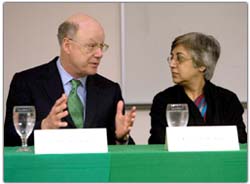|
The
Earth Charter and Higher Education
|
 |
|
Professor Steven C. Rockefeller, Co-chair, Earth
Charter International Council and
Dr. Kiran Chhokar,
Programme Director, CEE, Higher Education |
|
An Earth
Charter Scholars� Consultation was held on Sanibel Island,
Florida, USA, from 19-24 February 2009. Its purpose was to
focus on understanding and strengthening the Earth
Charter�s contribution to education for sustainable living
in higher education. A dozen scholars from different parts
of the world - Australia, Costa Rica, Germany, India, Mexico
and USA - participated in the consultation. Rick Clugston,
who is spearheading the setting up of CEE USA, had
organized the consultation in collaboration with the
Center for Environmental and Sustainability Education (CESE)
of the Florida Gulf Coast University (FGCU).
The Earth
Charter Scholars� Consultation was the first gathering to
review a wide variety Earth Charter based educational
resources that have been developed over the 20 years that
individuals and organizations have been drafting the Earth
Charter and translating it into action. Participants
evaluated educational resources that reference the Earth
Charter, reviewed the best essays on the Earth Charter to
craft a developing selected bibliography, drafted a �Guide
to Teaching and Learning with the Earth Charter,� and
identified further resources to be developed, such as a
special issue of the Journal of Education for
Sustainable Development on the Earth Charter to
coincide with Earth Charter +10 and an edited book that
showcases the best essays written on the Earth Charter.
The
consultation coincided with the formal signing of FGCU as
an affiliate of Earth Charter International. Six members
of the consultation group, including Dr. Kiran Chhokar,
Programme Director, CEE, Higher Education, presented a
panel and led a series of workshops for FGCU students,
faculty and staff as part of the Center for Environmental
and Sustainability Education�s Rachel Carson Distinguished
Lecture Series. |